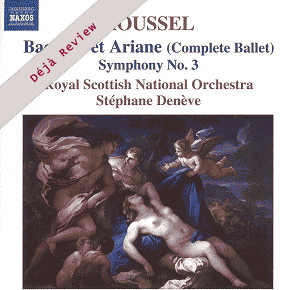
Déjà Review: this review was first published in June 2007 and the recording is still available.
Albert Roussel (1869-1937)
Symphony No. 3 in G minor, Op. 42 (1929)
Bacchus et Ariane, Op. 43 (1930)
Royal Scottish National Orchestra/Stéphane Denève
rec. 2006, Henry Wood Hall, Glasgow, UK
Naxos 8.570245 [63]
The works on this disc are two of Roussel’s most popular. They sit next to each other in his chronology. The Third Symphony was a Boston Symphony commission for its fiftieth anniversary season – a particularly fertile season for commissions, as it included Stravinsky’s Symphony of Psalms, Honegger’s First and Prokofiev’s Fourth!
Roussel’s Neo-Classicism as heard in the Third Symphony is not of the particularly gentle variety. There are themes of great suavité, it is true, but there is also an internal drive to the music. This verges on the pounding at times and it speaks of matters of greater import. There are some delightful wind solos, which are given life and beauty by the RSNO’s unnamed principals.
The ten-minute Adagio – by far the work’s longest movement – dares to venture into deep emotional regions before swerving towards the cafés of Paris after around three minutes. Spiky woodwind imitations are, in this performance at least, guaranteed to raise a smile, while the climax – just after the eight-minute mark – brings with it a complementary shudder.
If you want a coupling of this symphony with its successor, the Fourth, perhaps you should lean towards that still-underrated conductor Cluytens with the French National Radio Orchestra. This is on Testament SBT1239, where you will also get some excerpts from Bacchus as well as the Sinfonietta. The Vivace third movement lasts hardly any time at all (2:59) yet is chock-full of open-air delights and is not without a whiff of tomfoolery. The finale is busy but there is never any hint of rush. Only very occasionally do the first violins in their upper register sound strained, but it does not make for uncomfortable listening. The solo violin, though, is as sweet as anyone could wish for – a shame that the player is uncredited.
The ballet Bacchus et Ariane is divided into two suites. They are presented here with detailed tracking and titles in French with English translations. The Prélude is as rhythmically insistent as the opening of the Symphony before suddenly letting in an infectious jauntiness that informs also the ‘Games of the Young Men and Maidens’. After the playful, woodwind-dominated ‘Dance of the Labyrinth’, the arrival of Bacchus is graphically depicted by whirling woodwind; strangely enough this part reminded me of sections of Bartók’s Miraculous Mandarin. His later dance, shortly before the end of the first Suite, is at once delicate and yet ever so slightly clumsy – imagine a cow dancing on eggshells!
Suite 1 ends with Bacchus tenderly setting Ariadne down on the rock, while Suite 2 opens with a tender depiction of her sleep. The music of this second part of the ballet is astonishingly sensual, even erotic and here the first violins seem able to negotiate their upper registers beautifully. Roussel provides some openly descriptive music before the next set number, ‘Le baiser’, whereupon a glow seems to suffuse the music from within. Parts of the brief ‘L’enchantement dionysiaque’ are distinctly Straussian – evoking Alpensinfonie in particular. Sensuality reaches its apogee here. The dance of Ariadne and Bacchus is more animated, tramping around in almost bestial fashion. Then comes a Bacchanale and, finally, a coronation for Ariadne that winds the ballet up in energetic fashion.
Denève persuades his Scottish forces to play with real affection and, where appropriate, real force. Although Martinon on the Erato Anniversary label couples Bacchus with an equally apposite partner – the ballet Aeneas, from 1935 – this new Naxos carves a niche firmly for itself on any serious record collector’s shelves. The recording (Tim Handley) is fabulous; there is plenty of depth and definition.
Colin Clarke
Buying this recording via a link below generates revenue for MWI, which helps the site remain free.




















